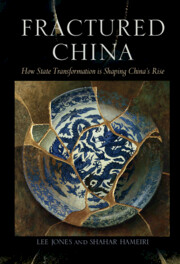Refine search
Actions for selected content:
3 results
4 - China’s International Development Financing
-
- Book:
- Fractured China
- Published online:
- 21 October 2021
- Print publication:
- 28 October 2021, pp 166-214
-
- Chapter
- Export citation
Introduction
-
- Book:
- Fractured China
- Published online:
- 21 October 2021
- Print publication:
- 28 October 2021, pp 1-19
-
- Chapter
- Export citation

Fractured China
- How State Transformation Is Shaping China's Rise
-
- Published online:
- 21 October 2021
- Print publication:
- 28 October 2021
